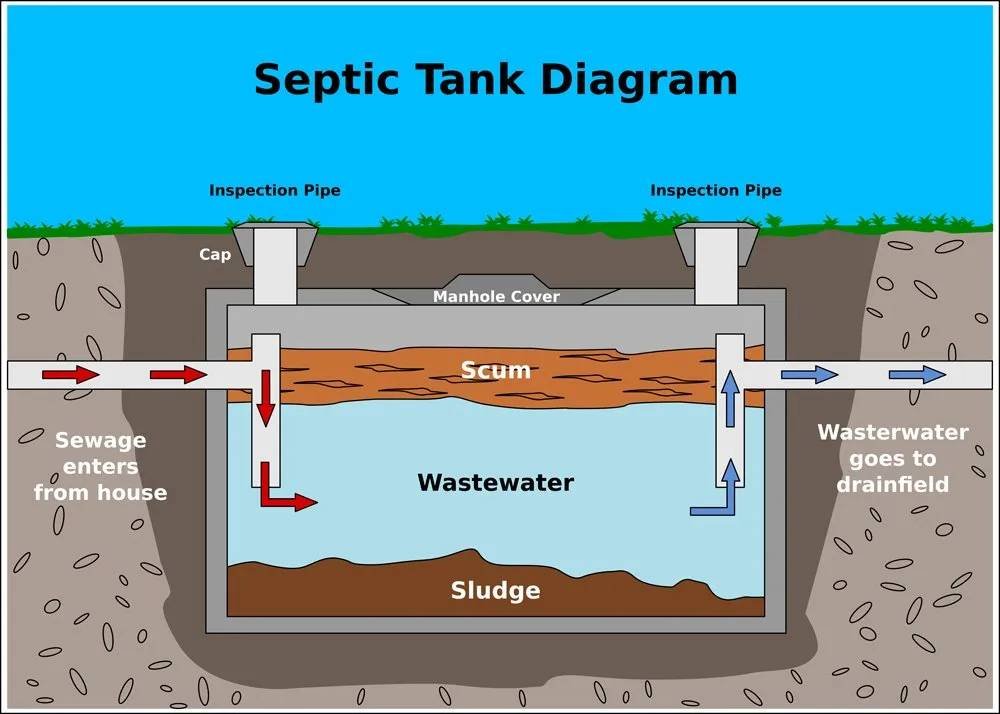RESIDENTIAL SEPTIC TANK PUMPING

UNDERSTANDING YOUR SEPTIC SYSTEM
If you are like the typical person, you know very little about your septic system. This is to be expected. In urban and suburban areas there are sewers to carry household waste to municipal wastewater treatment facilities. In areas that are more rural however septic tanks systems perform the roles of both sewers and treatment plants. A look at Webster’s dictionary defines the septic tank as a “tank in which waster mater is decomposed through bacterial actions”.
If you were to take a cross section of your septic tank, you would discover the presence of three layers. The top layer, known as the “scum” layer, consists of organic material which floats on the surface. Bacteria present in the septic tank transform this substance into a liquid. The middle or “Effluent” layer is where mostly clear water is found. The clear water found in this area is the only substance that should enter your absorption area. The third and bottom layer is the “Sludge” layer where the inorganic or inert solid material and bacteria digestion by-products settle.
The septic system is the channel for all household waste. For this very reason, a properly working septic system is essential to health, property value, and the environment. Simple put: a neglected system will become blocked…will overflow…will have a foul odor…and will cause contamination and pollution. With just the small commitment to maintaining your septic system through regular pumping (and possible bacteria additive), protection from the nightmare of a failed system will be accomplished.
Warning Signs of Septic Systems Failure
- Drainage in the home is sluggish
- Backups in plumbing
- Gurgling sound coming from pipes and drains
- Odor outdoors
- In septic system area greener grass, mushy ground, or wastewater surfacing/pooling in yard.
Septic Tank Treatment

SYSTEM BALANCE
When functioning properly, household wastes are collected in your septic tank and then broken down, liquified, and deodorized by natural occurring bacteria. Because this process is biological, it is easily upset and may stop working.

SEPTIC KLEAN 3
Septic Klean 3 restores the natural biological process and boosts any existing biological process. Following regular monthly applications will keep your septic tank working effectively, prevent expensive emergencies, and help prevent early or additional pumping costs.

EASY TO USE
Using Septic Klean 3 is simple... Just drop in the convenient pre-packaged, pre-measured pouches into your lavatory bowl and flush. The plastic pouches are specially designed to dissolve away so you don't have to handle the powder. No fuss, no bother, no effort!
We listed ten things you can do to be a good septic system owner. It’s important to take care of your system with regular pumps and inspections to prevent disruptions in your system, environmental hazards, and costly repairs down the road.
TOP 10 WAYS TO BE A GOOD SEPTIC OWNER
- Have your system inspected every three years by a qualified professional or according to your state/local health department’s recommendations
- Have your septic tank pumped, when necessary, generally every three to five years
- Avoid pouring harsh products (e.g., oils, grease, chemicals, paint, medications) down the drain.
- Discard non-degradable products in the trash (e.g., floss, disposable wipes, cat litter) instead of flushing them
- Keep cars and heavy vehicles parked away from the drainfield and tank
- Follow the system manufacturer’s directions when using the septic tank cleaners and additives
- Repair leaks and use water efficient fixtures to avoid overloading the system
- Maintain plants and vegetation near the system to ensure roots do not block drains
- Use soaps and detergents that are low-suds, biodegradable, and low- or phosphate-free
- Prevent system freezing during cold weather by inspecting and insulating vulnerable systems parts (e.g., the inspection pipe and soil treatment area)
Nancy’s tip: “It’s better to have septic systems pumped out too soon rather than too late.”

